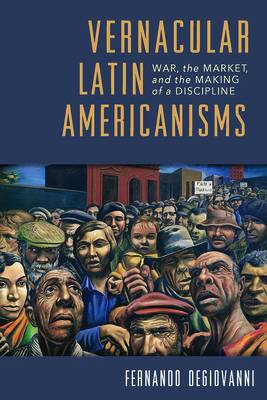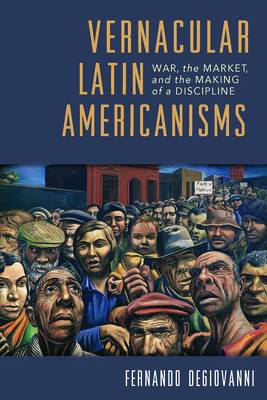
Je cadeautjes zeker op tijd in huis hebben voor de feestdagen? Kom langs in onze winkels en vind het perfecte geschenk!
- Afhalen na 1 uur in een winkel met voorraad
- Gratis thuislevering in België vanaf € 30
- Ruim aanbod met 7 miljoen producten
Je cadeautjes zeker op tijd in huis hebben voor de feestdagen? Kom langs in onze winkels en vind het perfecte geschenk!
- Afhalen na 1 uur in een winkel met voorraad
- Gratis thuislevering in België vanaf € 30
- Ruim aanbod met 7 miljoen producten
Zoeken
€ 32,95
+ 65 punten
Omschrijving
In Vernacular Latin Americanisms, Fernando Degiovanni offers a long-view perspective on the intense debates that shaped Latin American studies and still inform their function in the globalized and neoliberal university of today. By doing so he provides a reevaluation of a field whose epistemological and political status has obsessed its participants up until the present. The book focuses on the emergence of Latin Americanism as a field of critical debate and scholarly inquiry between the 1890s and the 1960s. Drawing on contemporary theory, intellectual history, and extensive archival research, Degiovanni explores in particular how the discourse and realities of war and capitalism have left an indelible mark on the formation of disciplinary perspectives on Latin American cultures in both the United States and Latin America. Questioning the premise that Latin Americanism as a discipline comes out of the tradition of continental identity developed by prominent intellectuals such as José Martí, José E. Rodó or José Vasconcelos, Degiovanni proposes that the scholars who established the discipline did not set out to defend Latin America as a place of uncontaminated spiritual values opposed to a utilitarian and materialist United States. Their mission was entirely different, even the opposite: giving a place to culture in the consolidation of alternative models of regional economic cooperation at moments of international armed conflict. For scholars theorizing Latin Americanism in market terms, this meant questioning nativist and cosmopolitan narratives about identity; it also meant abandoning any Bolivarian project of continental unity or of socialist internationalism.
Specificaties
Betrokkenen
- Auteur(s):
- Uitgeverij:
Inhoud
- Aantal bladzijden:
- 248
- Taal:
- Engels
- Reeks:
Eigenschappen
- Productcode (EAN):
- 9780822965541
- Verschijningsdatum:
- 11/12/2018
- Uitvoering:
- Paperback
- Formaat:
- Trade paperback (VS)
- Afmetingen:
- 150 mm x 226 mm
- Gewicht:
- 385 g

Alleen bij Standaard Boekhandel
+ 65 punten op je klantenkaart van Standaard Boekhandel
Beoordelingen
We publiceren alleen reviews die voldoen aan de voorwaarden voor reviews. Bekijk onze voorwaarden voor reviews.









